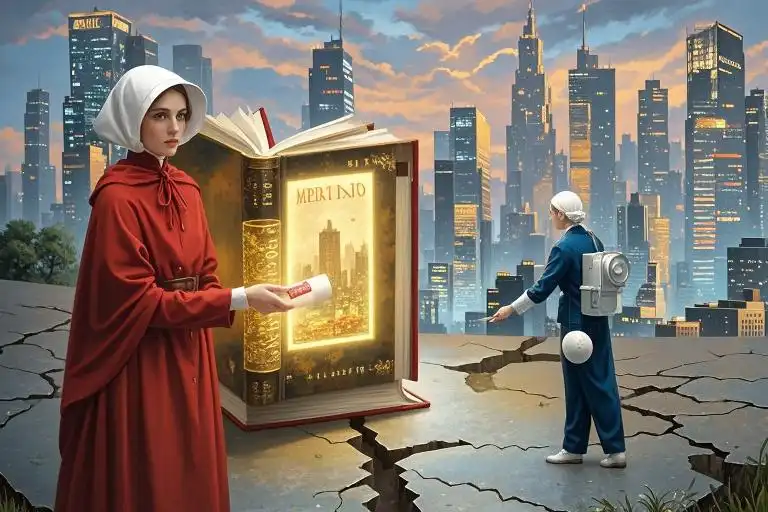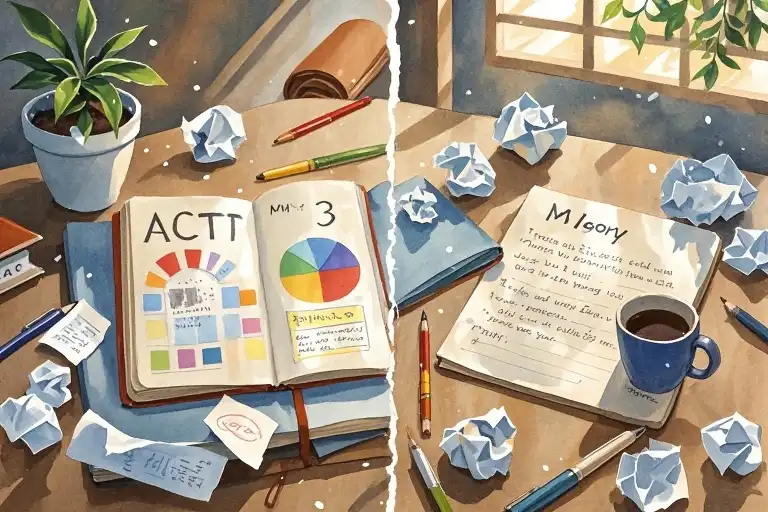Have you ever finished a novel and felt reality shift? I still remember reading Margaret Atwood’s The Handmaid’s Tale during a foggy autumn evening, my tea gone cold as Gilead’s red-cloaked women seemed to materialize in the London mist outside my window. This eerie sensation — this collision between fiction and fact — lies at the heart of a delicious paradox: Do writers mirror society, or does society mirror their writings?
Let’s play detective. 🕵️♀️
The Case of the “Accidental Prophet”
In 1985, Atwood insisted her dystopia was “nothing that hadn’t happened somewhere before.” Fast-forward to 2022: Texas lawmakers quote Gilead’s fertility crisis while debating abortion bans. Coincidence? Or did her crimson-cloaked metaphor seep into policymaking like ink through parchment?
Here’s where it gets trippy. When Huxley wrote Brave New World in 1931, his “feelies” (emotionally manipulative cinema) seemed laughably absurd. Scroll TikTok today and watch AI-curated clips hijack dopamine receptors with surgical precision. Did Huxley predict — or subconsciously blueprint — our doomscrolling dystopia?
Poetry That Planted Nightmares
Let’s time-travel to 1922. T.S. Eliot’s The Waste Land drops like a bombshell, its fractured verses echoing shell-shocked soldiers’ tremors. But wait — did those haunting lines “I will show you fear in a handful of dust” merely reflect postwar trauma? Or did they fertilize the 20th century’s existential dread, making Camus’ The Stranger inevitable?
Dig deeper. Medieval scribe Thomas Malory described Arthurian wastelands cursed by unholy grail quests. Cut to 2023 climate summits where delegates quote “ecological wastelands.” Coincidence? Or proof that stories are time-traveling seeds planted in humanity’s psyche?
Your Brain on Fiction (No, Really!)
Neuroscientists have a juicy secret: Reading about lemon tart activates taste cortexes. When millions collectively devour dystopias, do we unknowingly rehearse authoritarianism? It’s like reverse-engineering IKEA furniture — except we’re assembling societal frameworks from fictional manuals!
Try this thought experiment: If every copy of Orwell’s 1984 vanished tomorrow, would surveillance capitalism crumble? Probably not… but its cultural vocabulary (“Big Brother,” “doublethink”) might. Stories are linguistic viruses that mutate how we articulate — and therefore perceive — reality.
Become a Reality Architect
Here’s the thrilling twist: You’re already shaping tomorrow’s narratives. Every book club debate, every fanfic penned, every meme shared adds brushstrokes to our collective canvas. Remember how #MeToo weaponized Margaret Atwood’s line — “Men are afraid women will laugh at them. Women are afraid men will kill them” — into a global reckoning?
So next time you binge Black Mirror, notice that tingling at your fingertips. It’s not just suspense — it’s your latent power as a story alchemist. Will your bedtime stories to children seed Mars colonies? Could your tweet thread inadvertently rewrite constitutional amendments?
The Never-Ending Story
As I write this, dawn breaks over London. Somewhere, a teenager highlights The Hunger Games, unknowlingly rehearsing revolution. A policymaker skims 1984 during recess, shivering at its relevance. And Malory’s ancient wasteland — now pixelated into climate change documentaries — flickers on tablets worldwide.
Reality and fiction aren’t enemies; they’re dance partners in a masquerade ball. The music never stops — but here’s your golden ticket: You hold the pen that bridges what is and what could be.
So tell me, dear co-conspirator: What story will you unleash next?


